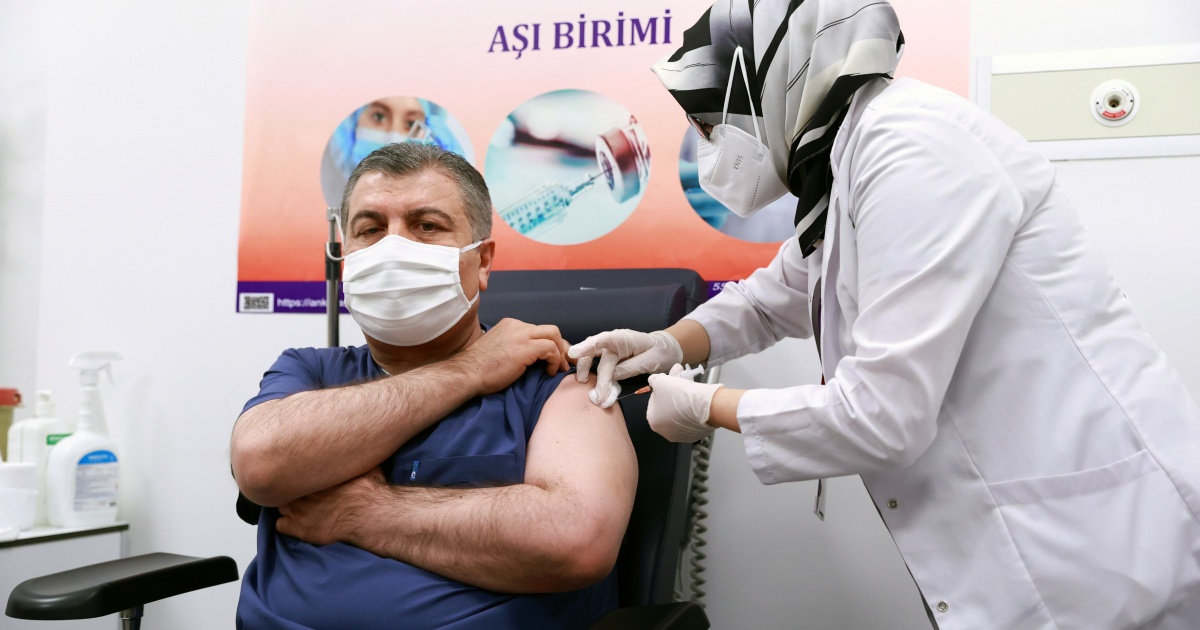CoronaVac has come under increasing scrutiny after Brazilian researchers found it to be just more than 50 percent effective.
Turkish doctors and nurses rolled up their sleeves on Thursday as the nation of 83 million people launched a mass coronavirus vaccination drive with China’s Sinovac jab.
Health Minister Fahrettin Koca received the first shot of CoronaVac live on television after formally approving the vaccine on Wednesday despite contradictory data about its efficacy rate.
He was followed by Turkish President Recep Tayyip Erdogan, who received the vaccine at a hospital in Ankara, according to state-owned Anadolu news agency.
Preliminary studies involving more than 7,000 volunteers in Turkey showed CoronaVac to be 91.25 percent effective.
The shot, however, came under scrutiny from regulators after the latest data from Brazil showed it to be just more than 50 percent effective – slightly above the benchmark that the World Health Organization fixed for a vaccine to be effective for general use.
The previous week, Brazilian researchers said it was 78 percent effective but it revised that figure saying it did not include all the data from clinical trials.
A third trial in Indonesia pointed to a 65.3 percent success rate, further raising concerns about transparency from the Chinese manufacturers.
The Beijing-based pharmaceutical company has defended the jab saying it is still safe for use.
‘A hope for everybody’
Turkish television was plastered with images on Thursday of healthcare workers receiving their first doses as officials tried to raise awareness and acceptance of the vaccine.
A doctor receives a shot of Sinovac’s CoronaVac COVID-19 vaccine at the Sancaktepe Sehit Dr Ilhan Varank Training and Research Hospital, in Istanbul, Turkey [Murad Sezer/Reuters] More than 2.3 million people have been infected by the coronavirus in Turkey and more than 23,000 have died.
After covering 1.1 million healthcare workers, the vaccination programme will move on to essential workers and people aged 65 and older.
“The last two months have been very critical in Turkey, that is why this is hope for everyone,” said Al Jazeera’s Sinem Koseoglu, reporting from a public hospital in Istanbul where the health workers were given the vaccine.
“The clinical results that Brazil revealed raised concerns among the public. However, according to the polls here, at least 41 percent of Turkish people are willing to have the vaccine.”
Professor Recep Demirhan, chief physician at an Istanbul hospital, assured the public over the vaccine’s safety while receiving a shot.
“Our citizens should not worry,” he told reporters. “We have conducted preliminary testing of all vaccines coming to Turkey and they are safe.”
Turkey has signed up for 50 million doses of CoronaVac of which 20 million are due to arrive by the end of the month.
The official Anadolu Agency reported Turkey also sent 20,000 doses to the breakaway state of Northern Cyprus.
In December, Turkey also reached a deal to receive 4.5 million doses of the Pfizer-BioNTech vaccine by late March.
Officials hope to receive up to 30 million doses of the Pfizer-BioNTech jab, although talks are still ongoing.
